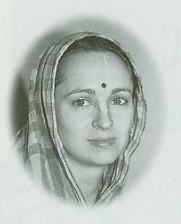CHILDREN NEED LOTS of love. Love your children, and then love them some more. It's said that every great man had a mother who gave him much love.

Urmila Devi Dasi
We often hear such glorification of love. But what does love really mean? The stereotype of a smiling parent holding a child with great care is not the complete picture of parental love. Judith Viorst, writing in Newsweek, says, "It didn't take me long to learn that patient, tender, loving, serene, and empathic weren't always options for the mother of three intensely physical boys."
Some adults spoil or ruin children through what appears to be lots of love. And some adults are harsh, even cruel, in the name of love.
Perhaps the dictionary will help us understand real love. Webster's first definition for love is "a strong affection for another arising out of kinship." In other words, we tend to love our family and relatives. While such love is natural for embodied, materially conditioned souls, it's imperfect for two reasons. First, it's based solely on the body, and second, it's based solely on bodies related to our own, so it's simply extended selfishness. When our love for children rests only on a selfish, material platform, we'll inevitably act in ways we feel are best for us, not necessarily for our children. Surely this love is inadequate for those aspiring for spiritual elevation.
Webster also defines love as "warm attachment, enthusiasm, or devotion." While devotion here could imply a sense of serving another person unselfishly, it also conjures up a picture of the doting mother who smothers her child with so much enthusiastic care that the child never really grows up.
Webster's most applicable definition is "unselfish loyal and benevolent concern for the good of another." The dictionary's example is that of God's love for man. If we accept this as a good definition of genuine love, we can then ask, "How does Krsna love His children, all living beings? And from Krsna's example, what can we learn about the best way to love our own children?"
Krsna stays with and cares for all His children, the obedient and the offensive. He perfectly reciprocates with the desires and inclinations of each soul. If we are fully devoted to Him, He will appear in the form and relationship we desire. If we wish to be an independent lord, He will give us an opportunity to be Lord Brahma, the head of a material universe.
Krsna knows each of us completely, and He directs our wanderings from lifetime to lifetime, letting us experience enough suffering and frustration to eventually turn to Him. He also arranges for all human beings to have access to scripture and saintly persons. He even comes Himself to teach the most beneficial path.
To follow the Lord's example when dealing with children, we can show love by guiding them in the best course of action and the best mentality. We can also set the best example. To some extent we can teach our children by letting them experience the natural consequences of their actions and desires. Or, better, we can help them learn without direct experience. Whenever a child shows a desire to act to please Krsna and follow the scriptures, we can encourage and assist.
What is truly good for a child is the same as what is truly good for all beings to realize that one is a spiritual being, not a material body, and to serve Krsna rather than the temporary world. When we train a child in such a life, we represent Krsna's love.
What about the small, sweet tokens of affection that materially illusioned adults show their children? Do the spiritually-minded abandon these as mere attachment and bondage? Not at all. Looking at Krsna's example again, we can see that when He shows His love for us in small ways, we naturally feel gratitude, understanding that He cares for us fully. Similarly, the hugs, smiles, little gifts, words of endearment, and time spent playing together show our children a depth of personal concern, a complete love.
Urmila Devi Dasi and her family run a school in North Carolina. She is the major author and compiler of Vaikuntha Children, a guide to Krsna conscious education for children.
